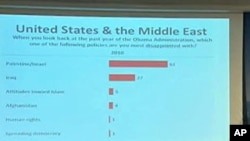Washington D.C. is filled with research organizations -- so-called "think tanks -- that span the political spectrum from right to left and from neutral to highly ideological. Some specialize in topical areas, such as in social problems, economics or defense. All provide opinions on policy and aspects of governance.
Washington, D.C. is a city filled with opinions -- about nearly any topic you could imagine. And, many of those opinions come from research organizations -- so called "think tanks" -- that have become an integral part of the U.S. public-policy process.
Some of these research organizations frame issues within the context of certain political or social viewpoints. Others remain detatched from the political fray, and simply provide facts with which decisionmakers can reach conclusions.
Former U.S. Ambassador to the United Nations John Bolton, who is now with a research organization called the American Enterprise Institute, or AEI, says "think tanks" differ in approach as well as orientation. "There is a huge range of difference among the various institutions. Some are philosophically based. Some do work for the government on government contracts addressing particular issues. Others, like AEI, Brookings [The Brookings Institution], Heritage [The Heritage Foundation], [and] CSIS [The Center for Strategic and International Studies] are completely funded independently of the government," he explained.
Most 'think tanks' are set up on a non-profit basis. They get their operating cash from grants by charitable foundations, from individuals who believe in their missions, and from corporations who get a tax benefit for their contributions.
Jeffrey Hiday at the RAND corporation says that even though RAND is paid for some of its work by the U.S. government and private sector entities, it insists on remaining neutral regarding the issues being examined. He says that helps to maintain the credibility of its research, and its recommendations.
"The key thing is that we try to play it right down the middle. We [RAND] are all about chasing facts, and applying objective analysis to those facts. What we hope is that that leads us into a place that is completely non-ideological. [Again], We are all about facts," Hiday states, "All about objective analysis. And, we are neither right nor left. We are attacked by [the] left, and [the] right."
But, for some research organizations, determining the facts of an issue is only the beginning. They then step outside the traditional academic role into activism, as Georgetown University professor Mark Rom points out. "They don't just have research. They go out and promote that research. They don't just say 'Here is our study.' They actually become lobbyists. And so, their scholars will meet with Members of Congress, [and] meet with people in the Executive Branch to say 'Here is what we found, and here is what you should do.' They move across the line from a researcher," he says, "to becoming salespeople. They have an idea that they want to sell."
Professor Rom says examples of such advocacy can be found among some of the research organizations that focus on social issues, the environment, and also, nuclear disarmament.
To resolve the potential conflicts of an organization conducting both research and activism, some separate the two activities. One example is the Center for American Progress. Chief Operating Officer Neera Tanden says part of the organization works like a traditional think tank.
"Which is very much focused on having policy folks sit around a table in whatever venue and think through what the challenges are to the country and what the solutions should be," Tanden says, "So, they very much engage in that kind of basic research work and basic policy work. Then, we [also] have the American Progress Action Fund, which is an advocacy organization. So that organization [the Action Fund] is more focused on taking the ideas that the Center for American Progress has, and promoting them on the [Capitol] Hill, promoting them in the media, promoting them in the states, and promoting them in the White House. We are interested in moving ideas in a more progressive direction."
Besides conducting research and making recommendations on issues, these 'think tanks' perform yet another role in Washington.
As is the case with Ambassador Bolton, they provide a place where people with significant experience in a previous presidential administration can continue to work on important policy issues. And, to wait for changing political fortunes and a possible return to government.







